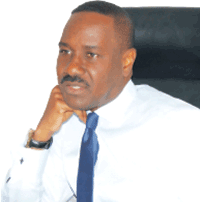The term toddler comes from the way children first walk, which is at first unsteady and more like a toddle than actual walking.
Toddlerhood begins with the second year of life, after the child’s first birthday. It starts crawling vigorously, starting to walk, even talking a little. At age three, the child is no longer a toddler but a pre-schooler, although the word ‘toddler’ is sometimes used to describe a child as old as four years. One major task for the toddler is to learn to be independent.
Nigeria became an independent nation in October 1960. Using our analogy of a toddler, Nigeria was a toddler between 1961 and 1963. Then it was bustling with energy and ideas. There was the need to explore the world. We wanted to be independent, but we were still very dependent on the British, who waited to nurture this new baby called Nigeria and balance its need for independence with the need for discipline.
Nigeria was 54 years old last Wednesday.
At 50, a person, man or woman is in the golden age of their life. There is a common adage that “a fool at 40 is a fool forever”. It means that a man at 40 who does not know what he is doing is wasting his time. A 50-year-old man has spent not less than 20 in the workforce and probably even preparing to retire. Such a man, if not a grandpa, has children who are teenagers or even in their youths.
Fifty-four years of our sojourn as a nation, hope on one hand and despair on another describe the feelings of most Nigerians. In the 2009 Human Development Report (HDR) of the United Nations (UN), Nigeria is ranked 158 out of 182 countries and classified as a Medium Human Development Country. In 2003, we placed 152 out of 175 countries. So, obviously, there has been no improvement. Nigeria is ranked behind countries like Slovakia (42), Croatia (45), Libya (55), Seychelles (57), Bosnia and Herzegovina (76). Even Tunisia (98), Gabon (103) and Algeria (104) are all ranked ahead of Nigeria. Most of these countries do not have the human, financial and mineral resources that Nigeria has.
The HDR looks beyond the Gross Domestic Product (GDP) to a broader definition of well-being to determine placements of countries.
The Human Development Index (HDI) provides a composite measure of three dimensions of human development: living a long and healthy life (measured by life expectancy), being educated (measured by adult literacy and gross enrolment in education) and having a decent standard of living, which is measured by purchasing power parity (PPP) income.
Life expectancy at birth is put at 48 years.
Nigeria in 54 years, rather than grow from a toddler to a matured man, has retrogressed. Before someone starts making excuses for our failure to grow and develop, let’s take a look at a nation that was born around the same time as Nigeria. Nigeria is even older by five years.
As at 1960, Singapore (independence in August 1965) had no identity of her own and her prospects were dire. Through various strategies, Singapore was able to survive the turmoil. The Singapore economy is an example of a vibrant free-market economy that is developing at a rapid pace. Contrary to the country’s economic disaster back in the 1960s and 70s, Singapore’s per capita income improved, supported and strengthened by a corruption-free environment, an educated and motivated workplace and a well-established legal and financial business framework. In recent years, the Singapore government has invested heavily in diversifying the economy. This has led to growth in the tourism industry, the pharmaceutical industry with a particular focus on biotechnology, financial services, education, multimedia, retail, leisure and the medical technological industry.
Her basic policy is to maximise the potential of her people, so they can contribute to themselves and the country. All the institutions – from parliament, finance to education and transport – share a common goal.
Singapore has been able to succeed because of its leaders whose philosophy from the start was: view the current situation; examine your capabilities to cope with that situation; the skills and capabilities you do not possess you must acquire from abroad when possible. The country is now considered as one of the fastest growing nations in the world and an example to others. Singapore’s long term goal is to surpass the United States per capita Gross National Product (GNP) by 2030.
At 54, Nigeria is still a toddler learning to be independent. We are still very much dependent on the World Bank, the International Monetary Fund (IMF), the United Nations, the European Union, the United States, the United Kingdom and the Commonwealth. Our dreams at Independence have all been truncated. We are one of the most undisciplined nations on earth. We lack a way of life that should normally enable a smooth running of affairs. Somehow, we are being controlled by elements that should be under our control. This has consequently led to a lot of stress, frustration and irritability among our people.
I think it is possible to have an organised society, a responsive government and a responsible people, and to begin to do things the way they should be done.
Nigeria has the potential to rise, but it must get certain things such as power supply, security, rule of law, infrastructure and the right leadership right. It must unleash the economy and encourage a system that brings the best out of people, a system that rewards excellence over mediocrity.
It has the boldness and character to rise to the top, but lacks the moral fibre, as corruption and greed are quite rampant and must be rooted out. Needless to say, Nigeria is moving at a painfully slow pace with a desperate need for improvement.











